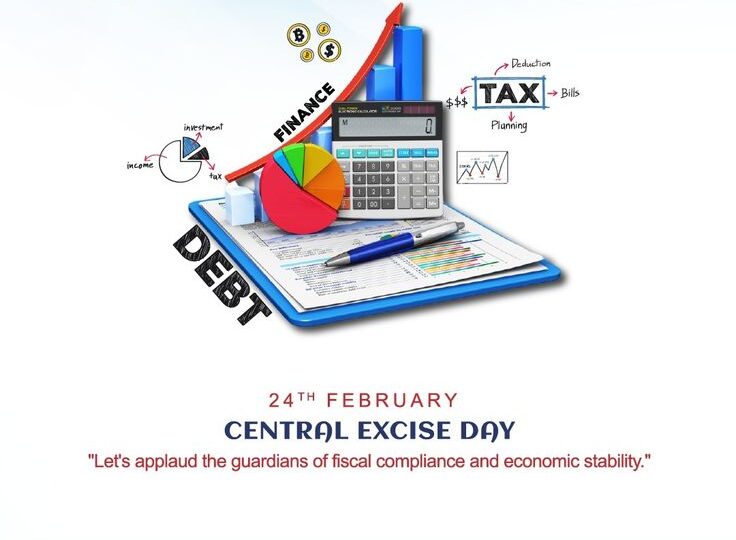Central Excise Day 2025: Understanding Its Significance, Impact, and Observance
Central Excise Day 2025: Central Excise Day is observed every year on February 24th in India to recognize and celebrate the role of the Central Excise Department in the economic growth and development of the country. Established to commemorate the day when the Central Excise and Salt Act was enacted in 1944, this day serves as a reminder of the significance of excise duties in the Indian economy and their contribution to the government’s revenue.
History of Central Excise Day
The history of Central Excise Day dates back to the enactment of the Central Excise Act of 1944. Prior to this law, excise duties were a crucial part of India’s revenue system, but it was the formalization of the Central Excise Act that laid the foundation for the efficient collection of taxes and levies. The Act was designed to regulate the manufacture, sale, and consumption of certain goods, including excise duties on manufactured goods, as well as the collection of taxes on products like alcohol, tobacco, and petroleum.
The day became symbolic as it highlights the importance of excise taxes in sustaining the economy and the role of the department in ensuring the efficient collection of these revenues. In 1986, it was officially recognized as Central Excise Day, and now it is marked by various events and activities that showcase the work done by the Central Excise Department and its employees.
Significance of Central Excise Day
Central Excise Day holds immense importance, both symbolically and practically, for the economic and fiscal stability of India. Some of the key reasons this day is celebrated are:
- Economic Contribution: The excise duties collected by the government form a significant portion of India’s total tax revenue. It helps fund various public welfare programs, infrastructure development, and economic initiatives. The celebration of this day underscores the essential role of excise duties in supporting government functions and sustaining the country’s economy.
- Recognition of the Excise Department’s Efforts: Central Excise Day provides an opportunity to recognize the hard work and contributions of the officers and staff in the Central Excise Department. The day honors their commitment to ensuring the proper functioning of the tax system, enforcing compliance, and making sure that the excise duties are collected fairly and effectively.
- Awareness Building: Central Excise Day is an occasion to raise awareness among the public and businesses about the importance of excise duties, the types of goods taxed, and the role of the department in ensuring compliance. This helps improve the understanding of excise laws and promotes cooperation between businesses and the authorities.
- Encouraging Efficient Taxation: By observing this day, the government aims to highlight the importance of a transparent and efficient tax system. It fosters awareness about the necessity of paying taxes and fulfilling obligations in a timely and ethical manner. It also encourages reforms in the excise system to reduce complexities and enhance efficiency.
Facts about Central Excise Day
- Date of Observation: Central Excise Day is observed annually on February 24th.
- Year of Establishment: The day was first celebrated in 1986 to honor the contributions of the Central Excise Department and raise awareness of excise duties.
- Role in Tax Collection: Excise duties are a major source of income for the Indian government and contribute to the financing of public projects.
- Excise Act: The Central Excise Act of 1944 governs the collection of duties on manufactured goods. It came into effect after the British colonial rule ended and was part of India’s post-independence fiscal reforms.
- Impact on Industry: The excise department ensures the proper collection of taxes on industries such as manufacturing, alcohol, and petroleum products, all of which are significant contributors to India’s economy.
Observance and Celebrations
Central Excise Day is marked with various events, including conferences, workshops, seminars, and award ceremonies. These events are usually organized by the Central Board of Indirect Taxes and Customs (CBIC), and are aimed at educating the public and business owners about the excise laws, their responsibilities, and the ongoing efforts by the department to streamline tax collection processes. Additionally, recognition is given to officers who have performed exceptionally well in their duties.
Many government officials, as well as industry leaders, also participate in these observances, discussing matters related to the excise department’s role in economic development, ways to simplify tax compliance, and addressing any challenges faced by businesses and tax collectors.
Impact on Daily Life
While excise duties may seem like a technical aspect of taxation, they have a direct impact on the daily lives of individuals and businesses. For example:
- Price of Goods: Excise duties influence the price of many goods, such as fuel, tobacco, and alcoholic beverages. These duties are often passed on to consumers, making it an important aspect of pricing strategies for manufacturers and retailers.
- Industry and Employment: Excise duties impact industries that produce goods subject to taxation. The proper functioning of the excise system ensures smooth production processes, contributing to job creation and the health of the economy.
- Government Services: The funds generated through excise duties are used for public welfare services such as healthcare, education, infrastructure, and defense, all of which contribute to the betterment of society and quality of life.
Frequently Asked Questions (FAQs)
- What is Central Excise Day?
- Central Excise Day is a day celebrated in India to commemorate the enactment of the Central Excise and Salt Act of 1944. It is observed annually on February 24th to recognize the contributions of the Central Excise Department in ensuring the smooth functioning of tax collection.
- Why is Central Excise Day important?
- It is important because it acknowledges the vital role excise duties play in the national economy. It highlights the importance of efficient tax collection, promotes awareness about excise duties, and celebrates the work of the Central Excise Department.
- What are excise duties?
- Excise duties are taxes levied by the government on goods produced within the country. These goods include products like alcohol, tobacco, fuel, and manufactured goods. The excise department ensures these duties are collected efficiently and fairly.
- How does Central Excise Day impact society?
- Central Excise Day impacts society by raising awareness of the importance of taxes and promoting a sense of responsibility among citizens and businesses. It also highlights how excise duties fund critical government services that benefit the public.
- How is Central Excise Day celebrated?
- Central Excise Day is celebrated with seminars, workshops, and award ceremonies to educate the public and businesses about excise laws and the role of the excise department. Officials and industry leaders come together to discuss tax compliance and improvements in the tax system.
Significance to Society
The significance of Central Excise Day lies in its role in ensuring the country’s economic stability. Excise duties are a fundamental part of India’s tax system, helping to finance critical government services and infrastructure projects. Moreover, Central Excise Day raises awareness about the importance of tax compliance, encouraging businesses to follow the law and contribute to the country’s development. It reminds everyone, from industrialists to consumers, of their role in ensuring a fair and efficient tax system.
As we approach Central Excise Day 2025, it is a moment to recognize the contributions of the excise department and acknowledge how tax collection sustains the services and programs that shape our daily lives.










